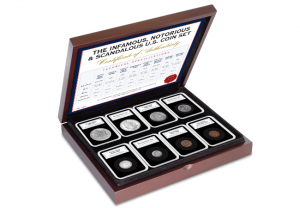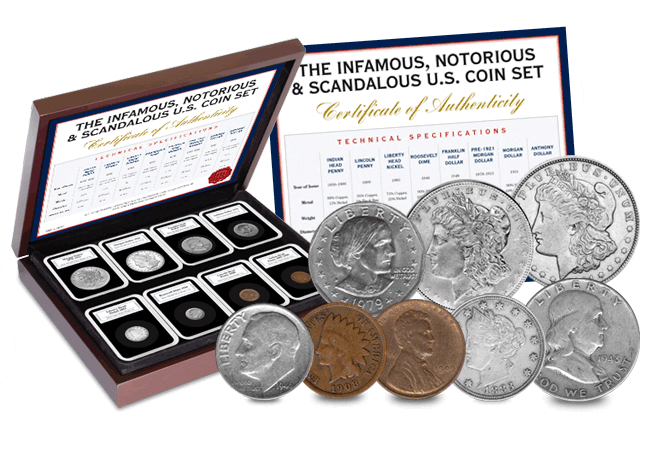Posts Tagged ‘Roosevelt Dime’
Celebrate Fourth of July with America’s most iconic coins
US coin collecting is one of the most competitive markets globally, which is no surprise given that the coins have some of the most interesting and iconic stories in the coin collecting world. US coins are in extremely high demand, especially in the UK where they rarely make it onto our shores.
As Americans celebrate their independence this week, I have picked out 5 of my favourite US coins to share with you.
The Flowing Hair Dollar
8 of the top 10 most expensive coins ever sold are American, with the Flowing Hair Dollar (1794-5) taking the top spot after it sold for an impressive $10,016,875. It’s thought that only 140 of these remarkable coins exist, so it is near on impossible to find one.
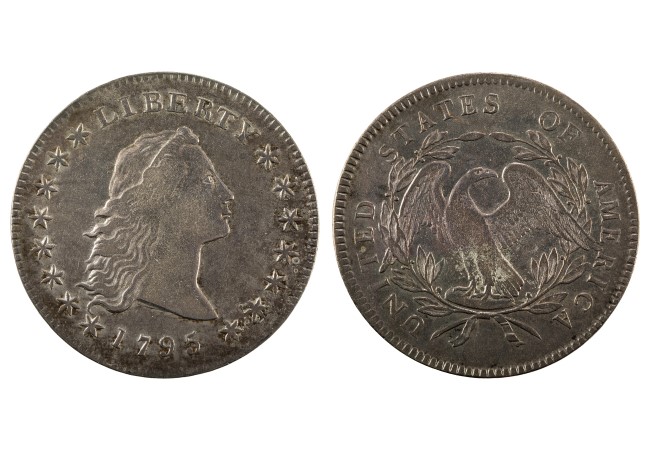
This coin was the first dollar coin ever issued by the United States Federal Government and featured an eagle and the bust of Liberty with flowing hair. It was minted in silver and its size and weight were based on the Spanish dollar, which was traded with regularly in the Americas.
The Morgan Dollar 1878-1921
The Silver Morgan Dollar has forever been associated with cowboys and outlaws. These coins could have been used for gambling by train robbers like Butch Cassidy or Jesse James. It’s even rumoured that cowboys would place them in their canteens to preserve water on long journeys.
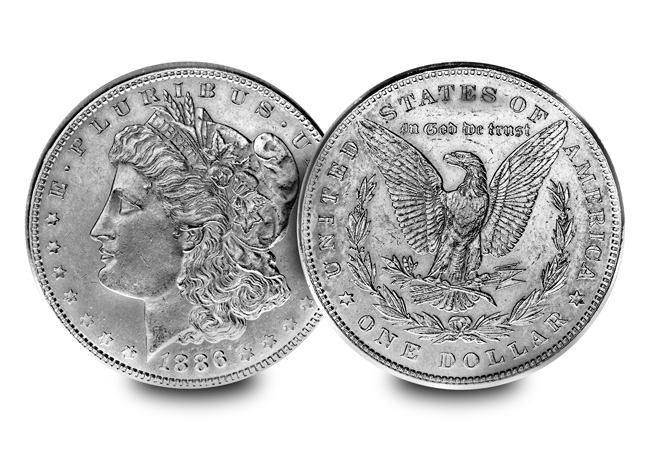
The dollar drew its name from its designer “George T Morgan”, who created an effigy of Lady Liberty as a Goddess, and a reverse which included an eagle with outstretched wings. It’s said that less than 1 in 5 of these coins remain today, making them incredibly collectable and difficult to source.
‘No Cents’ Liberty Head Nickel 1883
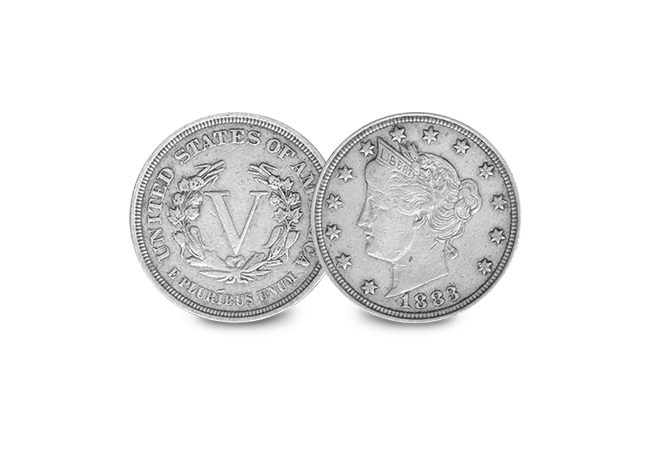
The first design for the No Cents Nickel failed to include the denomination and instead it included the Roman Numeral ‘V’. As the coins were the same size as a $5 coin, swindlers seized the opportunity to gold plate these coins and pass them off as $5 coins. Within the year the US Mint added the denomination to the coin.
The Roosevelt Dime 1946-64
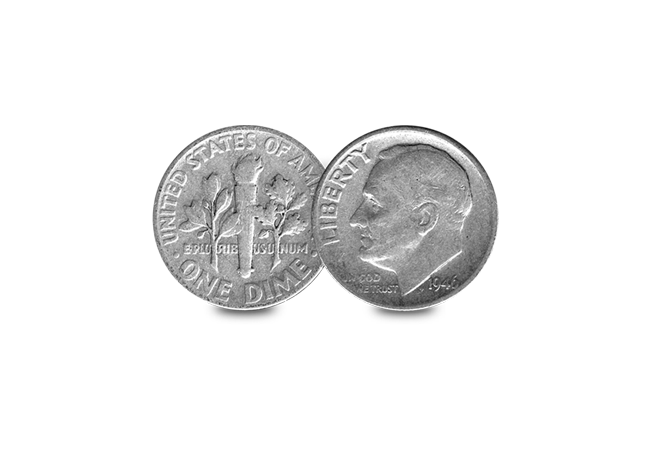
After the death of Franklin Roosevelt in 1945, the nation’s only four term president, his portrait was subsequently used on Dimes as a memorial.
During his presidency, Roosevelt founded ‘March of the Dimes’, a charity founded in response to polio epidemics. Roosevelt’s image was chosen for the Dime in honour of his work with the charity, and his own battle with polio. This coin was symbolic for a nation in mourning, and many people collected the coin from their change.
The Franklin Half Dollar 1948-1964
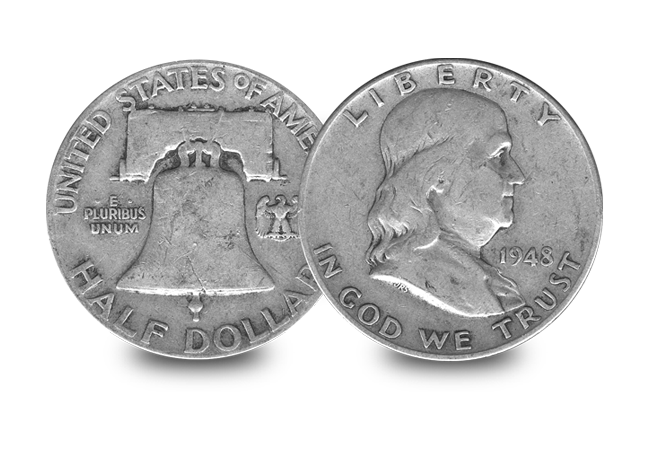
This was the first half dollar to feature the portrait of a non-president on American Coinage. The words ‘Liberty, in God we trust’ surround a portrait of Benjamin Franklin, with the Liberty Bell on the reverse. This was initially a controversial coin, and there were public concerns about the initials of the designer ‘JRS’ being a reference to Stalin and communism, as well as the small eagle placed next to the bell.
American coins give us some of the most interesting stories in history, and provide us with some of the most fascinating and collectable coins in the world. It’s no wonder that US coin collecting is becoming increasingly popular.
If you’re interested…
You can own a selection of America’s most fascinating and infamous coin issues with the Infamous US coins set. Click here to see the other coins and secure yours today>>>
America’s most infamous coins
Every coin tells a story. But few more than America’s eight most notorious coins…
Right now the U.S. collectible coin market is an absolute minefield. It is the most competitive coin collecting market in the world. In fact, every one of the top ten most valuable coins of all time is from the U.S.
Some of these coins date back to the 1800’s and all of them are extremely famous. Let me tell you why…

The Indian Penny – featuring a not-so-Native-American!
Indian Head Penny (1859-1909)
The Indian Head Penny is famous for celebrating Native Americans, but it actually doesn’t show a Native American.
According to legend, designer James B. Longacre used a portrait of his 12 year old daughter, Sarah, wearing a headdress. It is, however, more likely that the portrait was based on a classical Greco-Roman statue Venus Accroupie (Crouching Venus).
Either way, the ‘Indian’ is not a Native American! The obverse features the head of Lady Liberty wearing a headdress, while the reverse depicts a wreath as well as the words ‘One Cent’ and a shield in the middle at the top of the coin.
Morgan Silver Dollar (1878-1921)

The design inspired by a school teacher…
For the new silver dollar, designer George T. Morgan decided to portray Liberty as a goddess, inspired by Philadelphian school teacher, Anna Williams who had a fair complexion, Grecian nose and golden hair. Morgan eventually persuaded Anna Williams to sit as the model for Liberty for the obverse of the Morgan Silver Dollar.
In 1878 artists’ models were considered immoral, therefore, Morgan publicly stated that the model was a statue in a Philadelphia museum. Word soon leaked out, however, and it is rumoured that Williams was fired from her teaching job!
‘No Cents’ Liberty Head Nickel (1883)
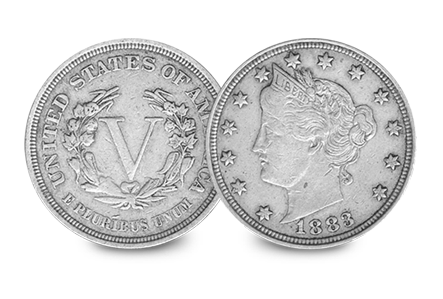
The coin that created an opportunity for crooks
When the new Liberty Head Nickel was issued in 1883, the denomination was nowhere to be seen, instead a large ‘V’ (Roman ‘5’) was on the reverse.
The coins were the size of the $5 gold coin in circulation at the time which created an opportunity for unscrupulous crooks who came up with a cunning plan to pass them off as $5 by gold plating the new nickels and cutting reeds into the edge by hand. The U.S Mint soon became aware and within a few weeks the design was changed to include the word ‘Cents’ under the ‘V’. The ‘No Cents’ coins are also known as ‘Racketeer’ Nickels.
Lincoln Penny (1909)

The first coin to feature Lincoln’s famous motto
Designer Victor David Brenner added his ‘VDB’ initials to the new Lincoln Penny design in 1909 which was issued to commemorate the 100th anniversary of Abraham Lincoln’s birth.
While the public generally loved the Lincoln cent when it was first released, they didn’t like the prominence of Brenner’s initials. The U.S. Mint quickly removed the initials as it appeared as though Brenner was either boasting or advertising. This was the first cent to feature Abraham Lincoln’s motto ‘In God we trust’ on the obverse.
Morgan Dollar (1921)
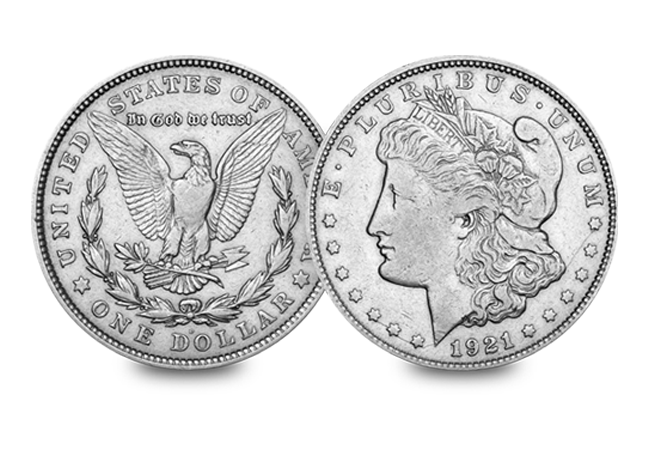
Forever associated with the notorious criminal couple Bonnie & Clyde
When notorious outlaws Bonnie and Clyde were shot and killed by police in 1934, a 1921 Silver Morgan Dollar was recovered from the jacket of Clyde Barrow among other possessions. The outlaw lovers were believed to have committed 13 robberies among other felonies between 1932 and 1934.
The hunt for the duo captured the nation’s imagination during the Great Depression and their fame was heightened by their practice of leaving glamourous photos of themselves at crime scenes.
Even more so now, the 1921 coin is forever associated with Bonnie and Clyde.
Roosevelt Dime (1946)

The stolen design…
In 1945 plans were quickly laid for the introduction of a new coin to honour Roosevelt after his passing. The task was assigned to John Ray Sinnock and coinage began in 1946. Controversy soon arose because sculptor Selma Burke claimed that Sinnock had stolen her design without giving her credit, however Sinnock strongly denied this.
In addition, conspiracy theorists claimed that Sinnock’s initials ‘JS’ (at the base of Roosevelt’s neck) actually referred to Russian leader Joseph Stalin because of Roosevelt’s supposed ‘communist’ learnings.
Franklin Half Dollar (1948)
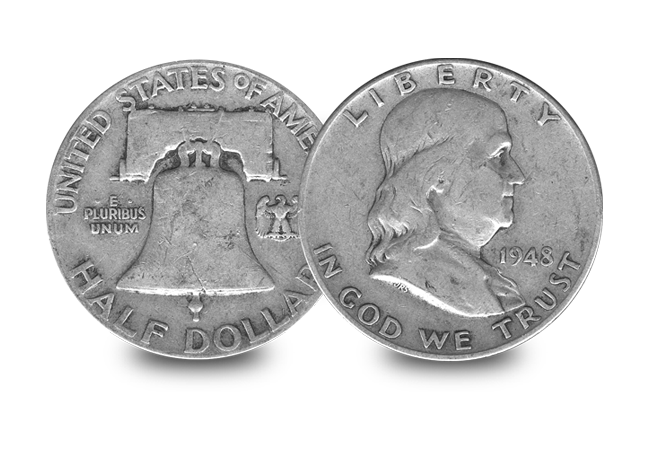
The coin that made a statment
The Franklin Half Dollar was designed by John R. Sinnock and his ‘JS’ initials were again seen by conspiracy theorists as a tribute to Joseph Stalin.
In addition, the crack on the Liberty Bell was controversial, some people saw it as a statement that Liberty in the United States was under threat (despite the fact that the image exactly reflects the bell’s appearance).
Finally, what appears to be a small ‘o’ and large ‘F’ on the reverse (‘oF’ in the United States of America) was rumoured to be a mistake and that the Mint would recall all 1948 coins to correct the ‘error’.
Anthony Dollar (1979)
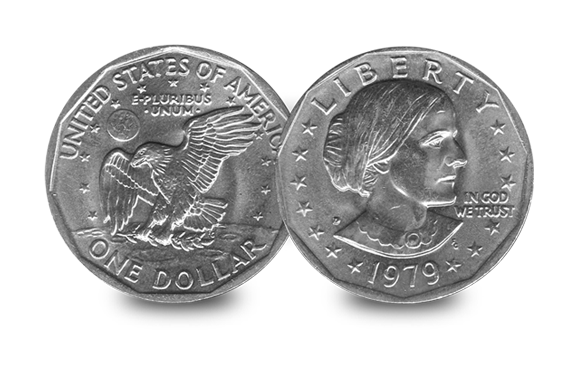
The Dollar that the public refused to use
The Anthony Dollar was revolutionary – the first circulating coin to feature a historical woman. Susan B. Anthony was an author and protest speaker among other titles but best known as President of the National American Suffrage Association. The coin was also the first small-sized Dollar that was issued for wide circulation.
However, it quickly became notorious – and almost universally rejected – because it was the same colour and about the same size as a quarter. Therefore, it was often mistaken for a Quarter, and the public refused to use it! (Interestingly, it is now a sought-after collector’s item.)
You can own all eight of these coins in ‘The Infamous, Notorious and Scandalous U.S. Coin Set’.

